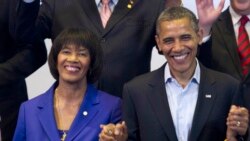One of the greatest obstacles to development in much of the Caribbean Basin is energy: it is too expensive and carbon-intensive. That is why energy was one of the main topics of discussion during President Barack Obama’s recent meeting in Jamaica with Caribbean Community, or CARICOM, leaders.
The United States can be a very constructive partner in addressing these issues, said President Obama after a meeting with Jamaican Prime Minister Portia Simpson-Miller:
“Oftentimes people of the Caribbean, despite having less resources, are paying significantly higher prices for energy. And if we can lower those costs through the development of clean energy and increased energy efficiency, we could unleash, I think, a whole host of additional investment and growth. And I think there are going to be a whole host of areas where the United States can be helpful.”
Electricity rates represent a major expense for Caribbean countries, many of which are highly dependent on energy-intensive industries such as tourism. With the fall in the costs of photovoltaic, wind and other renewable energy systems, viable options now exist to substitute for existing systems and meet growing energy needs.
That is why President Obama announced new projects and initiatives that will support the Caribbean Energy Security Initiative, a program that aims to help Caribbean countries transition to cleaner, more affordable and sustainable energy production through improved governance, increased access to finance, and greater donor coordination.
The United States plans to launch a $20 million facility to encourage investment in clean energy projects. The United States, along with Caribbean and Central American leaders will also, build on the recent announcement by the U.S. Overseas Private Investment Corporation, or OPIC, and will focus a team on Central America and Caribbean clean energy project opportunities. OPIC has already announced its finance support for two projects-- a 20 Megawatt solar farm, and a 36 Megawatt private-sector wind farm, both in Jamaica.
Complementing the new financing facility, the United States, CARICOM, and Central America will field a taskforce to identify ways to advance energy sector reform, regional integration, and clean energy development.
“Caribbean countries are particularly vulnerable to the effects of climate change, and we have to act now,” said President Obama. “Large countries and small countries have to work together, because without collective action, we’re not going to be able to address these challenges.”






